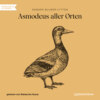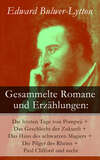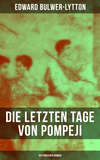Buch lesen: «Ernest Maltravers — Volume 07», Seite 2
Every day he grew more attached to that true philosophy which makes a man, as far as the world will permit, a world to himself; and from the height of a tranquil and serene self-esteem, he felt the sun shine above him, when malignant clouds spread sullen and ungenial below. He did not despise or wilfully shock opinion, neither did he fawn upon and flatter it. Where he thought the world should be humoured, he humoured—where contemned, he contemned it. There are many cases in which an honest, well-educated, high-hearted individual is a much better judge than the multitude of what is right and what is wrong; and in these matters he is not worth three straws if he suffer the multitude to bully or coax him out of his judgment. The Public, if you indulge it, is a most damnable gossip, thrusting its nose into people's concerns, where it has no right to make or meddle; and in those things, where the Public is impertinent, Maltravers scorned and resisted its interference as haughtily as he would the interference of any insolent member of the insolent whole. It was this mixture of deep love and profound respect for the eternal PEOPLE, and of calm, passionless disdain for that capricious charlatan, the momentary PUBLIC, which made Ernest Maltravers an original and solitary thinker; and an actor, in reality modest and benevolent, in appearance arrogant and unsocial. "Pauperism, in contradistinction to poverty," he was wont to say, "is the dependence upon other people for existence, not on our own exertions; there is a moral pauperism in the man who is dependent on others for that support of moral life—self-respect."
Wrapped in this philosophy, he pursued his haughty and lonesome way, and felt that in the deep heart of mankind, when prejudices and envies should die off, there would be a sympathy with his motives and his career. So far as his own health was concerned, the experiment had answered. No mere drudgery of business—late hours and dull speeches—can produce the dread exhaustion which follows the efforts of the soul to mount into the higher air of severe thought or intense imagination. Those faculties which had been overstrained now lay fallow—and the frame rapidly regained its tone. Of private comfort and inspiration Ernest knew but little. He gradually grew estranged from his old friend Ferrers, as their habits became opposed. Cleveland lived more and more in the country, and was too well satisfied with his quondam pupil's course of life and progressive reputation to trouble him with exhortation or advice. Cesarini had grown a literary lion, whose genius was vehemently lauded by all the reviews—on the same principle as that which induces us to praise foreign singers or dead men;—we must praise something, and we don't like to praise those who jostle ourselves. Cesarini had therefore grown prodigiously conceited—swore that England was the only country for true merit; and no longer concealed his jealous anger at the wider celebrity of Maltravers. Ernest saw him squandering away his substance, and prostituting his talents to drawing-room trifles, with a compassionate sigh. He sought to warn him, but Cesarini listened to him with such impatience that he resigned the office of monitor. He wrote to De Montaigne, who succeeded no better. Cesarini was bent on playing his own game. And to one game, without a metaphor, he had at last come. His craving for excitement vented itself at Hazard, and his remaining guineas melted daily away.
But De Montaigne's letters to Maltravers consoled him for the loss of less congenial friends. The Frenchman was now an eminent and celebrated man; and his appreciation of Maltravers was sweeter to the latter than would have been the huzzas of crowds. But, all this while, his vanity was pleased and his curiosity roused by the continued correspondence of his unseen Egeria. That correspondence (if so it may be called, being all on one side) had now gone on for a considerable time, and he was still wholly unable to discover the author: its tone had of late altered—it had become more sad and subdued—it spoke of the hollowness as well as the rewards of fame; and, with a touch of true womanly sentiment, often hinted more at the rapture of soothing dejection, than of sharing triumph. In all these letters, there was the undeniable evidence of high intellect and deep feeling; they excited a strong and keen interest in Maltravers, yet the interest was not that which made him wish to discover, in order that he might love, the writer. They were for the most part too full of the irony and bitterness of a man's spirit, to fascinate one who considered that gentleness was the essence of a woman's strength. Temper spoke in them, no less than mind and heart, and it was not the sort of temper which a man who loves women to be womanly could admire.
"I hear you often spoken of" (ran one of these strange epistles), "and I am almost equally angry whether fools presume to praise or to blame you. This miserable world we live in, how I loathe and disdain it!—yet I desire you to serve and to master it! Weak contradiction, effeminate paradox! Oh! rather a thousand times that you would fly from its mean temptations and poor rewards!—if the desert were your dwelling-place and you wished one minister, I could renounce all—wealth, flattery, repute, womanhood—to serve you.
* * * * *
"I once admired you for your genius. My disease has fastened on me, and I now almost worship you for yourself. I have seen you, Ernest Maltravers,—seen you often,—and when you never suspected that these eyes were on you. Now that I have seen, I understand you better. We can not judge men by their books and deeds. Posterity can know nothing of the beings of the past. A thousand books never written—a thousand deeds never done—are in the eyes and lips of the few greater than the herd. In that cold, abstracted gaze, that pale and haughty brow, I read the disdain of obstacles, which is worthy of one who is confident of the goal. But my eyes fill with tears when I survey you!—you are sad, you are alone! If failures do not mortify you, success does not elevate. Oh, Maltravers, I, woman as I am, and living in a narrow circle, I, even I, know at last that to have desires nobler, and ends more august, than others, is but to surrender waking life to morbid and melancholy dreams.
* * * * *
"Go more into the world, Maltravers—go more into the world, or quit it altogether. Your enemies must be met; they accumulate, they grow strong—you are too tranquil, too slow in your steps towards the prize which should be yours, to satisfy my impatience, to satisfy your friends. Be less refined in your ambition that you may be more immediately useful. The feet of clay after all are the swiftest in the race. Even Lumley Ferrers will outstrip you if you do not take heed.
* * * * *
"Why do I run on thus!—you—you love another, yet you are not less the ideal that I could love—if ever I loved any one. You love—and yet—well—no matter."
CHAPTER II
"Well, but this is being only an official nobleman. No matter, 'tis still being a nobleman, and that's his aim."
/Anonymous writer of 1772/.
"La musique est le seul des talens qui jouissent de lui-meme;
tons les autres veulent des temoins."1
—MARMONTEL.
"Thus the slow ox would gaudy trappings claim."
—HORACE.
MR. TEMPLETON had not obtained his peerage, and, though he had met with no direct refusal, nor made even a direct application to headquarters, he was growing sullen. He had great parliamentary influence, not close borough, illegitimate influence, but very proper orthodox influence of character, wealth, and so forth. He could return one member at least for a city—he could almost return one member for a county, and in three boroughs any activity on his part could turn the scale in a close contest. The ministers were strong, but still they could not afford to lose supporters hitherto zealous—the example of desertion is contagious. In the town which Templeton had formerly represented, and which he now almost commanded, a vacancy suddenly ocurred—a candidate started on the opposition side and commenced a canvass; to the astonishment and panic of the Secretary of the Treasury, Templeton put forward no one, and his interest remained dormant. Lord Saxingham hurried to Lumley.
"My dear fellow, what is this?—what can your uncle be about? We shall lose this place—one of our strongholds. Bets run even."
"Why, you see, you have all behaved very ill to my uncle—I am really sorry for it, but I can do nothing."
"What, this confounded peerage! Will that content him, and nothing short of it?"
"Nothing."
"He must have it, by Jove!"
"And even that may come too late."
"Ha! do you think so?"
"Will you leave the matter to me?"
"Certainly—you are a monstrous clever fellow, and we all esteem you."
"Sit down and write as I dictate, my dear lord."
"Well," said Lord Saxingham, seating himself at Lumley's enormous writing-table—"well, go on."
"/My dear Mr. Templeton/—"
"Too familiar," said Lord Saxingham.
"Not a bit; go on."
"/My dear Mr. Templeton:/—
"/We are anxious to secure your parliamentary influence in C——— to the proper quarter, namely, to your own family, as the best defenders of the administration, which you honour by your support. We wish signally, at the same time, to express our confidence in your principles, and our gratitude for your countenance./"
"D——-d sour countenance!" muttered Lord Saxingham.
"/Accordingly,/" continued Ferrers, "/as one whose connection with you permits the liberty, allow me to request that you will suffer our joint relation, Mr. Ferrers, to be put into immediate nomination./"
Lord Saxingham threw down the pen and laughed for two minutes without ceasing. "Capital, Lumley, capital—Very odd I did not think of it before."
"Each man for himself, and God for us all," returned Lumley, gravely: "pray go on, my dear lord."
"/We are sure you could not have a representative that would, more faithfully reflect your own opinions and our interests. One word more. A creation of peers will probably take place in the spring, among which I am sure your name would be to his Majesty a gratifying addition; the title will of course be secured to your sons—and failing the latter, to your nephew./
"/With great regard and respect,
"Truly yours,
"SAXINGHAM./"
"There, inscribe that 'Private and confidential,' and send it express to my uncle's villa."
"It shall be done, my dear Lumley—and this contents me as much as it does you. You are really a man to do us credit. You think it will be arranged?"
"No doubt of it."
"Well, good day. Lumley, come to me when it is all settled: Florence is always glad to see yon; she says no one amuses her more. And I am sure that is rare praise, for she is a strange girl,—quite a Timon in petticoats."
Away went Lord Saxingham.
"Florence glad to see me!" said Lumley, throwing his arms behind him, and striding to and fro the room—"Scheme the Second begins to smile upon me behind the advancing shadow of Scheme One. If I can but succeed in keeping away other suitors from my fair cousin until I am in a condition to propose myself, why, I may carry off the greatest match in the three kingdoms. /Courage, mon brave Ferrers, courage!/"
It was late that evening when Ferrers arrived at his uncle's villa. He found Mrs. Templeton in the drawing-room seated at the piano. He entered gently; she did not hear him, and continued at the instrument. Her voice was so sweet and rich, her taste so pure, that Ferrers, who was a good judge of music, stood in delighted surprise. Often as he had now been a visitor, even an inmate, at the house, he had never before heard Mrs. Templeton play any but sacred airs, and this was one of the popular songs of sentiment. He perceived that her feeling at last overpowered her voice, and she paused abruptly, and turning round, her face was so eloquent of emotion, that Ferrers was forcibly struck by its expression. He was not a man apt to feel curiosity for anything not immediately concerning himself; but he did feel curious about this melancholy and beautiful woman. There was in her usual aspect that inexpressible look of profound resignation which betokens a lasting remembrance of a bitter past: a prematurely blighted heart spoke in her eyes, in her smile, her languid and joyless step. But she performed the routine of her quiet duties with a calm and conscientious regularity which showed that grief rather depressed than disturbed her thoughts. If her burden were heavy, custom seemed to have reconciled her to bear it without repining; and the emotion which Ferrers now traced in her soft and harmonious features was of a nature he had only once witnessed before—viz., on the first night he had seen her, when poetry, which is the key of memory, had evidently opened a chamber haunted by mournful and troubled ghosts.
"Ah! dear madam," said Ferrers, advancing, as he found himself discovered, "I trust I do not disturb you. My visit is unseasonable; but my uncle—where is he?"
"He has been in town all the morning; he said he should dine out, and I now expect him every minute."
"You have been endeavouring to charm away the sense of his absence. Dare I ask you to continue to play? It is seldom that I hear a voice so sweet and skill so consummate. You must have been instructed by the best Italian masters."
Music is the sole talent which gives pleasure of itself; all the others require witnesses.
[Закрыть]




















